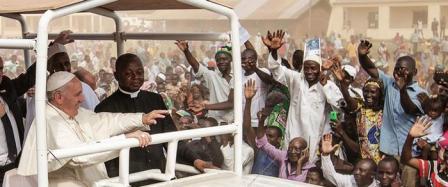Six years ago, this very day, Pope Francis was chosen to head the Catholic Church. The sixth anniversary of the election sees Pope Francis engaged in a year filled with important international journeys, marked at the beginning and the end by two “synodal” events: the meeting for the protection of minors, which took place last February with the participation of the presidents of the episcopal Conferences of the whole world; and the special Synod on the Amazon, which will be celebrated – also at the Vatican – this coming October.

Particularly noteworthy was the recent journey to the United Arab Emirates, which saw the Bishop of Rome signing a joint Declaration with the Grand Imam of Al-Azhar. It is a document that hopefully will have consequences in the field of religious liberty.
The theme of ecumenism will be prevalent in the upcoming journeys to Bulgaria and Romania, while the hoped-for – but not yet official – journey to Japan could help to keep alive the memory of the devastation caused by nuclear weapons, as a warning for the present and for the future of humanity that is living through the “piecemeal World War III” of which the Pope often speaks.
But a glance back at the year just passed cannot ignore the re-emergence of the abuse scandal, and of the internal divisions that led the ex-nuncio Carlo Maria Viganò to publicly call for the resignation of the Pope for the handling of the McCarrick case, precisely at the moment Pope Francis was celebrating the Eucharist with thousands of families in Dublin, proposing anew the beauty and value of Christian matrimony. Confronted with these situations, the Bishop of Rome asked all the faithful throughout the world to pray the Rosary every day, throughout the following Marian month of October, in order to unite themselves “in communion and penance, as the people of God, in asking the Holy Mother of God and Saint Michael the Archangel to protect the Church from the devil, who always seeks to divide us from God and to cause divisions among ourselves”. Such a detailed request is unprecedented in the recent history of the Church.
With his words and the appeal to the people of God that they pray to maintain unity in the Church, Pope Francis has made clear the gravity of the situation, and at the same time has expressed the Christian understanding that human remedies alone are not able to ensure a way forward.
Once again, the Pope has recalled what is essential: The Church is not made of super-heroes (or even super-popes), and does not move forward in virtue of its human resources or of its strategies. She knows that the evil one is present in the world, that original sin exists, and that in order to be saved we need help from above. Repeating that does not mean diminishing the personal responsibility of each individual, and even the responsibility of the institution, but of situating them in their real context.
In the Vatican communiqué announcing the Pope’s request for the Rosary last October, we read, “With this request for intercession, the Holy Father asks the faithful of the whole world to pray that the Holy Mother of God place the Church beneath her protective mantle: to preserve her from the attacks of the devil, the great accuser; and at the same time to make her more aware of the faults, the errors and the abuses committed in the present and in the past”.
“In the present and in the past” – because it would be an error put the blame on those who came before us, and to present ourselves as “pure”. Even today the Church must seek from some Other to be delivered from evil. This is a fact of reality that the Pope, in continuity with his predecessors, has constantly recalled.
The Church cannot redeem herself alone from the evils that afflict her. Even from the horrible abyss of sexual abuse committed by clerics and religious, one does not escape by means of the processes of self-purification, let alone by relying on those who have been charged with the role of purifier. More and more effective norms, responsibility and transparency are necessary, indeed indispensable, but they will never be enough. Because the Church, as Pope Francis reminds us today, is not self-sufficient precisely because she too recognizes herself as a beggar asking for healing, in need of mercy and forgiveness from her Lord and she bears witness to the Gospel to many wounded men and women of our time. Perhaps never before as in the troubled year just gone by, the sixth of his pontificate, has the Pope who presents himself as “a forgiven sinner”, testified to this essential and most relevant fact of the Christian faith, following the teaching of the Fathers of the Church and of his immediate predecessor Benedict XVI.
courtesy: Vatican Radio


